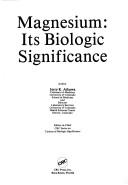| Listing 1 - 3 of 3 |
Sort by
|

ISBN: 084935871X Year: 1981 Volume: v. 1 Publisher: Boca Raton CRC
Abstract | Keywords | Export | Availability | Bookmark
 Loading...
Loading...Choose an application
- Reference Manager
- EndNote
- RefWorks (Direct export to RefWorks)
Pathological biochemistry --- Magnesium in the body --- Magnesium --- Chemical evolution --- Evolution chimique --- Physiological effect --- Molecular evolution.
Book
ISBN: 1616687215 9781616687212 1616683325 9781616683320 Year: 2010 Publisher: New York : Nova Science Publishers, Inc.,
Abstract | Keywords | Export | Availability | Bookmark
 Loading...
Loading...Choose an application
- Reference Manager
- EndNote
- RefWorks (Direct export to RefWorks)
Cadmium --- Antidotes. --- Zinc in the body. --- Copper in the body. --- Magnesium in the body. --- Body composition --- Antipoisonous agents --- Poisons --- Toxicology.
Book
ISBN: 1627030433 9786613937254 1627030441 128362480X Year: 2013 Publisher: [New York] : Humana Press,
Abstract | Keywords | Export | Availability | Bookmark
 Loading...
Loading...Choose an application
- Reference Manager
- EndNote
- RefWorks (Direct export to RefWorks)
Magnesium is an essential mineral which is required for growth and survival of humans. Since magnesium is a mineral and not synthesizable it must be obtained through dietary foods and/or supplements. Magnesium in Human Health and Disease reviews the benefits of magnesium supplementation to reach recommended intakes as well as provides new research that suggests how reaching levels above the recommended intakes can promote health and treat various diseases. Magnesium deficiency can cause low serum potassium and calcium levels, retention of sodium, and low circulating levels of regulatory hormones. These changes in nutrients cause neurological and muscular symptoms such as tremor and muscle spasms. Further magnesium deficiency causes loss of appetite, nausea, vomiting, personality changes and death from heart failure. Causes of magnesium deficiency include alcohol abuse, poorly controlled diabetes, excessive or chronic vomiting and/or diarrhea. Thus the effects of inadequate and deficient intakes or levels of magnesium is critical to health and are reviewed by the expert clinicians in this book. Magnesium in Human Health and Disease provides the most current research to support the potential benefits or lack thereof for normal and high supplementation with magnesium. Animal model research and early human trials are reviewed to document other disease states such as hypertension, cholesterol level, type 2 diabetes and cardiovascular disease that would benefit from increased magnesium.
Magnesium -- Metabolism -- Congresses. --- Magnesium -- Physiological effect -- Congresses. --- Magnesium. --- Minerals in human nutrition -- Congresses. --- Minerals in human nutrition. --- Magnesium --- Magnesium deficiency diseases --- Magnesium in the body --- Food --- Metals, Alkaline Earth --- Nutritional Physiological Phenomena --- Metals, Light --- Deficiency Diseases --- Metals --- Food and Beverages --- Elements --- Physiological Phenomena --- Malnutrition --- Inorganic Chemicals --- Phenomena and Processes --- Nutrition Disorders --- Technology, Industry, Agriculture --- Chemicals and Drugs --- Nutritional and Metabolic Diseases --- Diseases --- Dietary Supplements --- Magnesium Deficiency --- Nutritional Requirements --- Medicine --- Health & Biological Sciences --- Diet & Clinical Nutrition --- Metabolic & Nutritional Diseases --- Health aspects --- Health aspects. --- Medicine. --- Neurosciences. --- Nutrition. --- Health promotion. --- Cardiology. --- Clinical nutrition. --- Medicine & Public Health. --- Clinical Nutrition. --- Food Science. --- Health Promotion and Disease Prevention. --- Biotechnology. --- Light metals --- Magnesium group --- Personal health and hygiene. --- Food science. --- Neural sciences --- Neurological sciences --- Neuroscience --- Medical sciences --- Nervous system --- Heart --- Internal medicine --- Clinical sciences --- Medical profession --- Human biology --- Life sciences --- Pathology --- Physicians --- Alimentation --- Nutrition --- Health --- Physiology --- Diet --- Dietetics --- Digestion --- Food habits --- Science --- Health Workforce --- Nutrition . --- Food—Biotechnology. --- Health promotion programs --- Health promotion services --- Promotion of health --- Wellness programs --- Preventive health services --- Health education --- Clinical nutrition --- Diet and disease --- Dietotherapy --- Medical nutrition therapy --- MNT (Medical nutrition therapy) --- Nutrition therapy --- Therapeutics, Physiological --- Therapeutic use
| Listing 1 - 3 of 3 |
Sort by
|

 Search
Search Feedback
Feedback About UniCat
About UniCat  Help
Help News
News